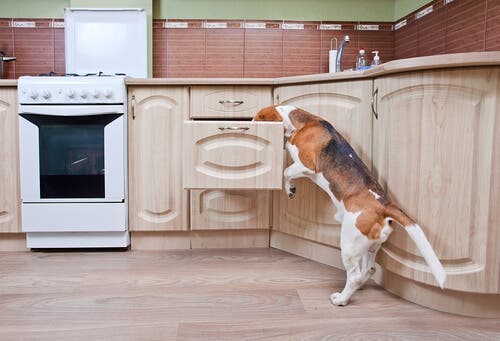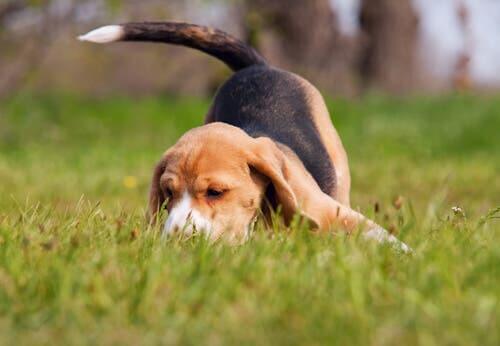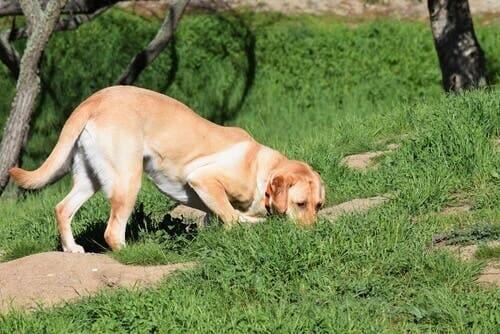Scent Games for Dogs: Brain Stimulation Through Smell

Dogs used their sense of smell as a means of survival in the wild. However, pets that live a pleasant domestic life can experience loss or atrophying of this sense, especially in their later years. Therefore, scent games for dogs are a good way to keep your pet stimulated by fun activities.
Scent games for the master trackers of the animal world
A human’s sense of smell is made of two small odor-detecting patches that have about six million receptor cells. Dogs, on the other hand, have about 300 million receptor cells. Not only do they far outweigh our atrophied sense of smell, but the part of their brains responsible for analyzing odors is 40 times larger.
Thanks to this innate tracking ability, dogs can help us find almost anything. From small hidden treasures such as truffles to clothing or lost objects. Police forces also make the most of these animals’ abilities to detect drugs or locate missing people.

Whether or not we want to make the most of this special sense, a domestic life doesn’t necessarily mean the end of the innate abilities that animals have in nature.
The scent games we’ll mention below can help our dog practice certain skills that can be useful to both the animal and the owner.
“Searching”: A continuous game based on smell
This stimulating method is based on the use of prizes or clothing that the animal is familiar with. It aims to create a fictional situation in which the dog plays the role of a tracker or predator, and the hidden object or prize is the prey.

Next, we will talk about how we can offer our dog certain challenges of greater or lesser difficulty with which to keep their sense of smell active.
Searching games
- The first of them is a game called ‘Find your food’ and will serve as a starter. Simply hide prizes or treats all over the house and wait for your dog to find them. As you unravel where they are, the animal will become more stimulated to track and look for potential new prizes. Increase the difficulty of hiding places and do it while you’re away from home to make it even harder.
- “New animal game”. This is based on the dog’s predatory instinct. The owner uses the scent of a new animal (it can be a cat or a different dog) and introduces it in the dog’s environment. The point is to see how it will react and if it subsequently recognizes the animal. You can spread the scent around the house, in the garden, and can introduce new variations from time to time.
- Playing “Hideout”. This game makes you the “prize” your dog has to look for. Try hiding under the bed, in the storage room or in a closet. It won’t be long before your pet misses you and starts looking for you. It will be guided by its powerful sense of smell and will certainly be happy to find you.
- In the wild, dogs used to have to track their prey directly in order to find their food. Thanks to domestication, pets simply go to the kitchen to access their food bowl whenever they’re hungry (or ask you for it). To make everything a little more interesting, you can start making some changes: place their food bowls somewhere different and force your pet to go outside in order to get its food.
- The breadcrumbs game. Dogs aren’t just interested in finding food or knowing where their owner is. As natural trackers, they will be attracted to any unfamiliar or new smells in their environment. Take, for example, essential oils from lavender or some other aromatic herbs and spray them on one of their toys. When the dog finds it, make sure to reward it with a treat. Once it’s used to the new smell, try hiding the toy in a place that’s harder to find and start placing pieces of perfume-impregnated paper as clues. When the dog becomes familiar with the dynamics of the game and finds the toy, give it a reward and lots of caresses.
In sum
There are many ways to keep our dear pets entertained by stimulating their sense of smell. With these kinds of games, the bond between the animal and its owner will become stronger. So will the quality of their precious sense of smell. However, let us remember that the key to any stimulus or training lies in positive reinforcements.
What are your favorite ways to stimulate your dog’s sense of smell? We hope found these recommendations helpful. Until next time!